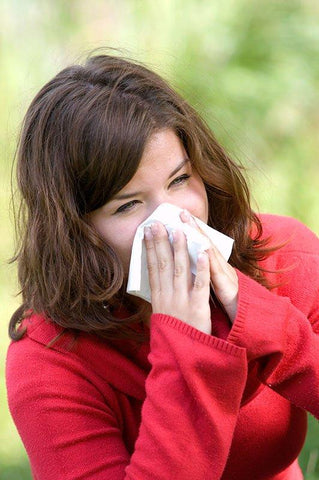
Is it COVID-19 or allergies?
, by Melissa McGinnis, 7 min reading time

, by Melissa McGinnis, 7 min reading time

Spring might be a time for rebirth, but it also marks the return of sniffles and sneezes that can drive you crazy. As the weather warms, plants ramp-up pollen production reaping havoc on your sinuses and nasal pathways. Complicating the matter allergens irritate during the spread of the novel Coronavirus leaving many allergy sufferers worried and wondering—Is it seasonal allergies or COVID-19?
If you suffer from seasonal allergies, you're not alone. Many people experience yearly symptoms, while others have more sporadic cases. It's not unusual for people to develop allergies over time. The number of people reporting allergies has increased over the past few decades.1 Approximately 10-30% of adults and 40% of children have airborne allergies.2
Everybody is different therefore seasonal allergy symptoms can vary wildly in intensity from nonexistent to mild (albeit annoying) to severe. For the most unfortunate of allergy sufferers, the struggle is real! Everyday life may be negatively impacted. Having to work, care for family, and exercise is significantly more difficult with a constant runny nose and itchy, watery eyes.
We all overreact sometimes, and your immune system is no exception. Allergies are caused by the immune system mistaking harmless particles (known as allergens) for dangerous invaders. This causes the release of IgE antibodies which then attach to mast cells. If you come in contact with the same allergen again, these mast cells will release histamines, which are responsible for allergy symptoms.
In principle, any particle can trigger an immune response, however, the most common allergens include pollen (from trees, grass, and weeds), mold, pet dander, and dust mites. More than two-thirds of spring allergy sufferers have year-round symptoms3 due in part to being sensitive to multiple allergens.
Currently, most people are hunkering down in their homes amid concerns regarding the spread of the novel Coronavirus. Just because we're locked down and avoiding social gatherings doesn't mean that common allergens are keeping their distance.
Several common allergens such as pet dander and dust mites found in the home are common, but pesky pollen can also sneak inside from open windows and hitching a ride on pets or people walking inside, therefore avoiding seasonal allergies can be difficult.
This is especially concerning since the symptoms of seasonal allergies can overlap with those of COVID-19. Being able to distinguish between allergies and COVID-19 symptoms is important to stay safe and to protect others.
Below is a quick guide that can help you tell the difference between common seasonal allergy symptoms and COVID-19 symptoms.
It's important to note that while both allergies and COVID-19 symptoms tend to be characterized by specific symptoms, not everyone's experience is the same.
If you are worried that you have COVID-19, you should contact your healthcare provider. Seek immediate medical attention if you or someone you know is experiencing severe difficulty breathing.
Allergies tend to irritate the area of contact, therefore seasonal allergies due to airborne substances mainly afflict the upper respiratory system and eyes.
The most common symptoms of seasonal allergies include:
Possible, but less common symptoms that can overlap with COVID-19 include:
Symptoms not associated with seasonal allergies include:
The above symptoms are not due to allergies and are most likely due to a viral or bacterial infection. Take caution if you have a fever, coughing, sore throat, or shortness of breath.
COVID-19 is a viral infection that can affect various systems of the body, but especially the lower respiratory system. Infected people can be non-symptomatic or mild to severe symptoms.
Since this is a novel Coronavirus, scientists and healthcare professionals are still learning about the symptoms associated with COVID-19. Information may change as new evidence comes to light. For the most up-to-date information, visit the CDC's website.
Symptoms commonly associated with COVID-19, but not seasonal allergies include:4
Potentially overlapping symptoms between COVID-19 and seasonal allergies include:
Symptoms that are not commonly associated with COVID-19 include:
Seek medical help immediately if you're experiencing the following symptoms:5
Coronavirus is mainly distinguished by having a fever, chills, cough, and shortness of breath. These symptoms are less common (or completely absent) with seasonal allergies.
Coronavirus causes severe difficulty breathing which is largely responsible for hospital admissions. Oxygen levels drop well below normal and lung functioning suffers as inflammation or fluid build-up. This is why many COVID-19 patients require a ventilator to mechanically move air in and out of the lungs so the patient can breathe.
If you're experiencing upper respiratory symptoms such as sneezing, nasal congestion, sinus pain, or itchy, watery eyes, it's likely due to seasonal allergies. People can develop allergies over time, so even if you've never had allergies before, allergies are the most likely culprit.
If you're experiencing a fever, chills, muscle aches, and/or lower respiratory symptoms such as coughing and shortness of breath then this is not due to seasonal allergies but rather an infection. Contact your healthcare provider if you're concerned and seek immediate medical attention if you have severe difficulty breathing.
Allergies may not be dangerous, but they certainly get in the way of enjoying life and the great outdoors. While nature may be responsible for seasonal allergies, it has also provided the remedy.
AL-10 Plus for Advanced Seasonal Support is an exclusive blend of all-natural vitamins and herbs that won't make you feel drowsy and allow you to seize the day. Core to this unique formulation is Butterbur extract, which research suggests is helpful for seasonal allergies.4
Other ingredients include Echinacea, bee pollen, Vitamin C, Goldenseal, Licorice root, Nettle Leaf, and more. Each natural ingredient was hand-selected to help soothe your symptoms and allow you to breathe more easily.
If your symptoms are especially troublesome, try AL-10 with Quercetin Booster. Quercetin is a naturally occurring bioflavonoid that supports healthy histamine levels and a sustained, balanced immune response.
Taken together, our Optim Nutrition AL-10 Plus + Quercetin Booster combo pack products act synergistically to deliver a one-two punch of symptom relief.
Your immune system is responsible for fighting off dangerous viruses and bacteria. Having a healthy, well functioning immune system is critical to feeling your best.
To keep your immune system at its best make sure to:


![PRōZE Review [2020 Update]](http://hihealth.com/cdn/shop/articles/cbd_insider_article_graphic_featured_image-11.jpg?v=1591495027)